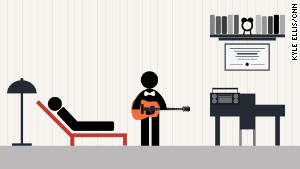You saw a post about the benefits of music. It was an article or maybe a video about how much music is helping people in a school, hospital, nursing facility, etc. You immediately thought of the music therapist you know and sent it to them! On behalf of all music therapists, thank you so much for supporting what we do, but I want to give you some guidelines for how you can help us even more.
More often than not, articles, videos, and blogs about music helping people fail to mention the profession of music therapy. They don’t interview or acknowledge a music therapist, they don’t provide information about the profession, and they don’t mention that it is an existing profession that has been around treating people for a hundred years.
This blog post is a checklist that you can use to know what constitutes music therapy and what doesn’t. If it doesn’t fit the criteria, consider leaving a comment with the original news site pointing them in the direction of music therapy!
1. Does the phrase “Board Certified Music Therapist” appear anywhere?
The presence of this phrase is rare, but it is the gold standard. If a person interviewed or mentioned in the article is referred to as a “Board Certified Music Therapist,” or has MT-BC after their name, then it’s legit!
2. Is there a link to the American Music Therapy Association? (musictherapy.org)
“AMTA is committed to the advancement of education, training, professional standards, credentials, and research in support of the music therapy profession.” AMTA lobbies, publishes research, hosts conferences, and provides resources to education and careers. If the article links to or mentions AMTA, then they are providing accurate info and giving readers a way to find a music therapist in their area.
3. Does it say “music therapy”?
This is a tricky one, because sometimes people call things “music therapy” that are not. However, the presence of the phrase is usually a good sign. Unacceptable terms include “musical therapy,” “music volunteers,” “healing music,” or “volunteer musicians.”
Speaking of…
4. RED FLAG: Are the musicians mentioned volunteers, nurses, or playing music exclusively on an iPod or boombox?
While music therapists do use recorded music in their practice, in articles the use of recorded music on an iPod or other such device is a big red flag indicating that what is taking place is NOT music therapy. Similarly, musicians who are volunteering are usually not music therapists. While it can be therapeutic to listen to music, a Board Certified Music Therapist can do a lot more for a person’s treatment goals.
So let’s say you put the article through this checklist and you discover that it’s not music therapy–what can you say? Here are a few examples of helpful, educational things you can respond with:
- “It’s wonderful that they are being helped by music, I wonder how much better it would be with a Board Certified Music Therapist.”
- “Music is such a powerful tool, did you know that there is a profession of music therapists who are trained to use it in treatment settings?”
And then you can provide a link to musictherapy.org!
I hope this was helpful. Thank you for supporting your local music therapist. Let’s all work together to spread this profession so all the wonderful therapists out there can work their magic.
Featured image from CNN


I’ve read your article and I did enjoy it. The article provides individuals with some things to search for when they are looking treatment. In my research, I have read some articles on music therapy for addicts and alcoholics.
Should anyone else be interested to see how this would help others here’s the page I looked at https://californiahighlands.com/music-in-recovery/
I hope this can assist with someone else as music therapy is very beneficial for everything!